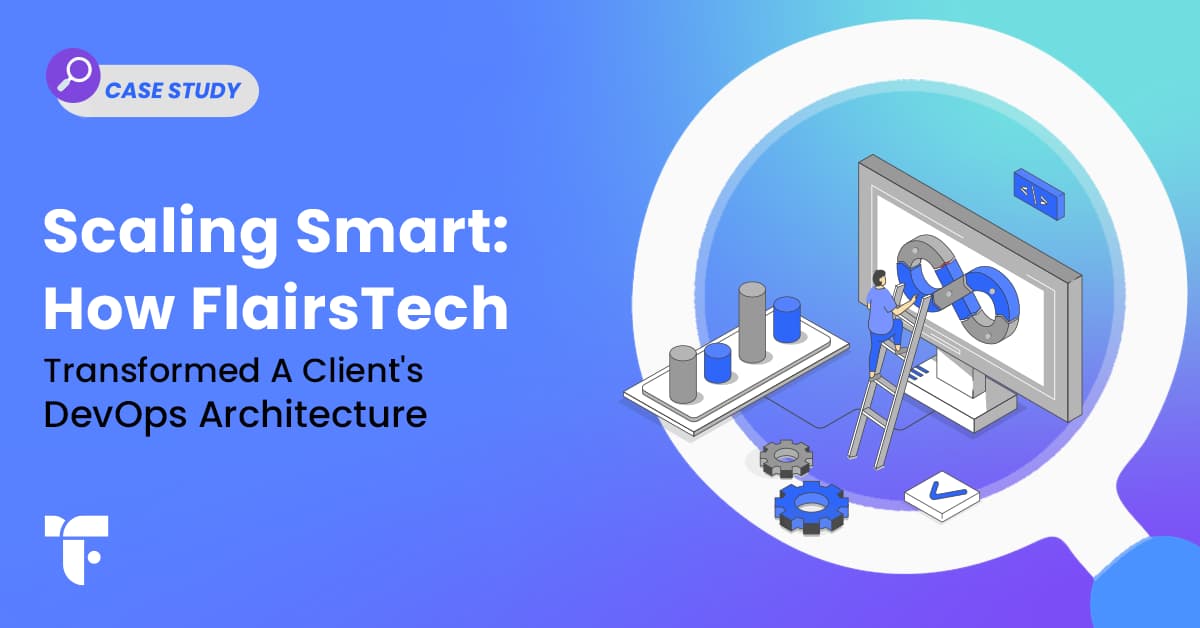- Home
- Case Studies
- Scaling Smart: How FlairsTech Transformed A Client's DevOps Architecture
Scaling Smart: How FlairsTech Transformed A Client's DevOps Architecture


Hagar Hadad
With over four years of experience in writing clear, research-backed technical content,...
More about the authorDecember 16, 2025
Development
3 mins
About the Client:
The client is a global hospitality software provider serving thousands of hotels and resorts that delivers comprehensive property management solutions with a strong focus on performance, reliability, and seamless guest experiences.
Challenges:
The client’s Pegasus platform was operating within a fragmented and high-risk DevOps architecture. Key challenges included:
- Backend and frontend pipelines lacked unified deployment standards across AWS CodePipeline
- Environment variables and secrets were stored in plaintext within GitHub and local files, creating major security vulnerabilities
- Shared Amazon ECR repositories across all environments led to image conflicts and limited traceability
- No defined process existed for creating isolated production or hotfix environments
- The platform lacked a regional deployment strategy, resulting in increased latency across APAC, UK, and North America
- CI/CD triggers were unreliable and misaligned with branching strategies (dev, dev2, qa, staging, hotfix, prod)
- No performance testing or autoscaling safeguards were in place, risking downtime under peak traffic loads
Solutions:
To lead a complete DevOps modernization and strengthen infrastructure security, our team executed a structured transformation plan following a detailed discovery workshop. The plan was the following:
- Architecture and Security Assessment
- Conducted a comprehensive review of AWS infrastructure, CI/CD pipelines, and branch workflows
- Identified critical risks including exposed credentials and unencrypted secrets
- Designed a secure secret management strategy using AWS Systems Manager Parameter Store and Terraform provisioning
- CI/CD Pipeline Modernization
- Refactored frontend and backend pipelines using AWS CodePipeline with Git-based triggers per environment
- Deployed isolated “devops” App Runner instances for safe validation and testing
- Introduced environment segregation in Amazon ECR with tagging for version traceability
- Infrastructure-as-Code (IaC)
- Developed modular Terraform scripts for consistent deployment of backend and frontend services
- Integrated dynamic environment variable injection from AWS Parameter Store
- Implemented labeled deployments via App Runner to streamline rollout processes
- Performance, Scalability, and Resilience
- Enabled autoscaling using AWS App Runner to support high-traffic demands
- Validated multi-region deployment strategies using AWS Route 53 and App Runner to reduce latency in APAC, UK, and North America
- Conducted load testing in the devops environment to ensure stability and zero downtime under peak conditions
Impact:
The DevOps transformation delivered tangible improvements across security, performance, and scalability:
- Eliminated all exposed secret risks with a secure, compliant configuration using Parameter Store
- Achieved full environment parity and version isolation with redesigned ECR and App Runner setups
- Reduced infrastructure provisioning time from hours to minutes through Terraform automation
- Enhanced global performance with multi-region deployments and lower latency
- Established a scalable, resilient DevOps foundation to support ongoing innovation and growth
I use 8 years of content excellence experience to ensure everything you read is accurate, backed by real industry data and insights.

